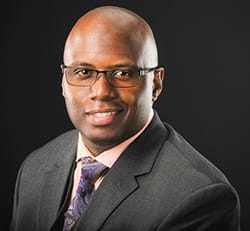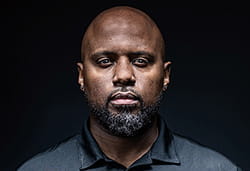
“I was in middle school when he was accepted,” says Dr. Bruce, a Walden University Doctor of Business Administration (DBA) graduate. “I saw that even though we had a single mom who couldn’t afford higher education for us, you could get a quality education at a prestigious university, get paid while you were learning, and have a great job with the military when you graduated.”
During Dr. Bruce’s 24 years in the Air Force, those jobs formed a career that spanned cybersecurity, supply chain management, healthcare administration and medical intelligence. He also continued his education while in the military. It was a struggle but also a source of pride.
“Going from a 1.87 grade point average as a freshman at the Academy to earning my doctorate at Walden while deployed in Afghanistan is my biggest accomplishment,” he says.
He chose the DBA to set himself apart from PhDs and EdDs. He was also able to leverage credits from his MBA, which helped him graduate sooner. While studying, he was stationed in Kandahar, working in medical logistics and enduring intense pressures on several fronts.
“I was going through a rocky marriage and the rigors of finishing up my doctorate, while experiencing rocket attacks at the same time,” says Dr. Bruce. “Early one morning, rockets struck just 40 yards away from me. Everything shook off the walls, and, after I peeled myself off the floor, I ran to a bunker and was the only one there for a while.”
That experience gave him time to reflect and realize that something wasn’t right. He needed someone to talk to, but the stigma attached to mental health prevented him from seeking care from the military. He looked for a life coach, but he struggled to find someone who had similar life experiences. Instead, Dr. Bruce got to work figuring out a path forward for himself and others in his situation.
He earned a certificate in the science of wellbeing from Yale University, and, combined with his business degrees, he used that knowledge and expertise to create an organization that helps veterans.
“Uplift Energy Coaching combines the strategic influence theory framework I learned in my doctorate program with my energetic self-perception and life as a Black male in the military,” says Dr. Bruce. “What I learned from Walden is that there are theories that can guide your life, so I decided to come up with my own theory that will resonate with others.”

“My work is at a tipping point,” says Dr. Bruce. “I now have the keys to a physical space in the incubator along with the support and networking I need to take the next step.”
Dr. Bruce envisions creating a contemporary space where minority veterans can come for assistance with veteran services organizations and for the life and business skills they need as they transition into civilian life. He was inspired by his life experiences, but he also recognized these same needs in other veterans as the founder and commander of the Western Maryland chapter of the National Association for Black Veterans. Now that he lives in central Maryland, he’s taking a regional role with the National Association of Minority Veterans of America. He sees similar challenges there that he hopes his organization can solve.
“Historically, Blacks and people of color were not welcomed into many veterans organizations,” he says. “I want to create a space where we can speak freely and authentically. A place that’s not divisive and where people understand where you’re coming from.”
He also founded the nonprofit Uplift In-Powerment to bring programs and resources to veterans and their families as they transition to civilian life.
“Minority veterans put on a façade like they’re good to go,” says Dr. Bruce. “Since everything in the military is an acronym, I think ‘FACADE' stands for fitness awareness, connectedness, anxiety, depression and energetic self-perception. The idea is to help veterans overcome the façade they have put up when they leave the military and try to enter the civilian workforce, enduring stress, anxiety, depression and disappointment. That’s what social change means to me, and that’s how I’m using my education and businesses to empower the greater good.”



